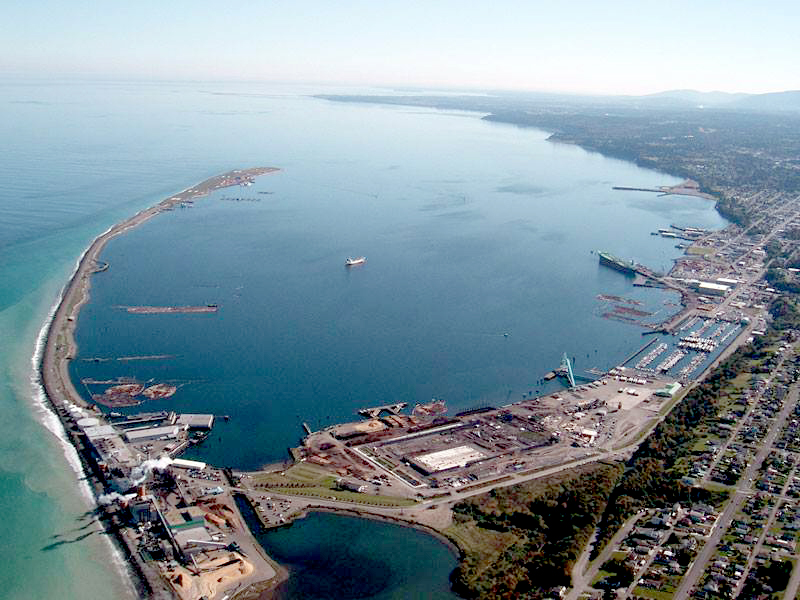PORT ANGELES — The Port of Port Angeles continues to violate state law and be noncompliant with port policies on lease contracts, according to a recently released state accountability audit of the port’s 2013 finances.
Violations included contracts that were under fair market value and lacked adequate security bonds, the audit said.
The port has resolved lease issues with seven of 11 businesses that were noted in the audit and is negotiating with the four remaining businesses, Karen Goschen, port deputy executive director-finance director, said Saturday.
Port officials have been addressing issues raised in the audit by working with tenants over the past several months to bring rents up to fair market value and make sure they have adequate security bonds, Goschen said.
For example, the port was allowing the Civil Air Patrol to occupy a building for no rent at all and was charging Magna Force $179 a month for 3.78 acres.
The Civil Air Patrol lease has been terminated, and Magna Force now pays $2,268 but is still negotiating with the port on a long-term lease.
Security bonds are issued by insurance companies or other third parties.
The bonds cover payment of leases during the duration of the agreement to protect the lessor.
The review, which examined the port’s compliance with its own procedures and state law, was conducted by state Audit Manager Carol Ehlinger and Assistant Audit Manager Abigail Berg.
They concluded that eight of 15 leases cited as noncompliant in 2012 remained in violation of state law or noncompliant with port polices as of Dec. 31, 2013.
Four of the 15 leases were compliant and three were terminated, but eight “had outstanding issues,” Ehlinger said in the Auditor’s Office’s Oct. 28 management letter on port finances.
Also, three of nine additional 2013 leases reviewed in 2014 did not have surety bonds as required by state law, Ehlinger concluded in her management letter on the audit.
“One of these agreements had been amended in June 2014 and still does not have a sufficient surety bond,” she said.
The port has resolved lease issues with seven of the 11 businesses that were noted in the audit and is negotiating with the four remaining businesses, Goschen said Saturday.
“Although the port has taken some action addressing the issues identified during the [2012] audit, noncompliance continues to occur,” Ehlinger said in the letter.
“They wanted to see more progress than we made,” Goschen said Saturday.
“We’ve been going through all our leases.
“We are focused on the fair-market-rent ones because that brings money to the port.
“Those require a longer negotiation than the bond security.”
Noncompliance means the port was not abiding by state law or its own policies.
A management letter cites issues of concern that warrant a written notification but are not included in the final audit report, Thomas Shapley, spokesman for the state Auditor’s Office, said Friday.
The 2012 report included a finding on the leases. A finding is the most serious conclusion of an audit, Shapley said.
Port officials say they are continuing to address issues on out-of-date leases.
In the review of 2013 rental agreements, six leases were expired and had not been renegotiated, and six did not have a surety bond as required by state law, according to the Oct. 28 letter to the port.
Questions surrounding port leases led to a 2013 whistleblower complaint by then-business manager and current port Commissioner Colleen McAleer.
Following a report on the complaint, Executive Director Jeff Robb resigned, then was hired by commissioners for a new position of environmental affairs director.
Robb retired in July from the position, which the port will not fund next year.
The port has 95 industrial and commercial leases that cover more than 100 acres of property on the Port Angeles waterfront and the area of William R. Fairchild International Airport.
Port officials “had a mountain of things to go through” in reviewing port leases and bringing them up to fair market value, Goschen said.
“We thought about hiring outside help, but the decision was made to go through it with current staff,” she added.
“There was a learning curve,” Goschen said.
“A number of items required negotiations with tenants.
“In order to bring those leases into compliance, some of those negotiations have taken a significant amount of time, way more than was anticipated.”
The port did not want to be heavy-handed with tenants who had not paid their security bonds or were not paying fair market rent, Goschen said.
“We don’t want to lose jobs,” she explained.
“Either way, there are pluses or minuses,” she added.
“By using a heavy-handed approach, then you have to do damage control going forward,” she said.
“So it’s [about] working with the tenants to ramp up the time to bring their rents up to fair market value and to get them to get bonds a higher level, which costs them money,” she said.
“They were talking about how this could mean us leaving our space and not renting from the port, and then we don’t have jobs.”
________
Senior Staff Writer Paul Gottlieb can be reached at 360-452-2345, ext. 5060, or at pgottlieb@peninsuladailynews.com.

